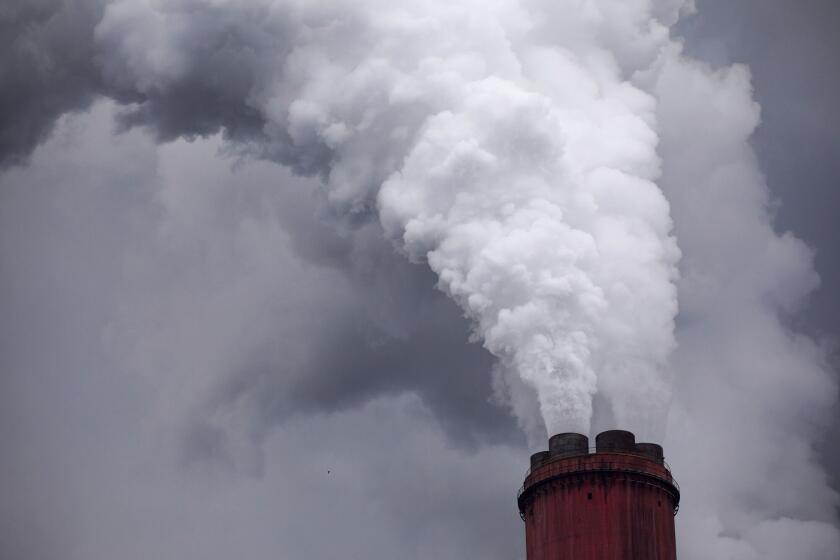Dow Climbs 7.57 to Crack 1,600 Barrier; Highest Close Ever
- Share via
NEW YORK — Climaxing a two-week rise of nearly 100 points, the Dow Jones industrial average cracked another record Thursday, closing above 1,600 points for the first time in history.
The Dow’s milestone closing of 1,600.69, up 7.57 points, came less than two months after it first closed above 1,500 and three months to the day after it breached 1,400--at a time when many Wall Street professionals were expecting the market to crest.
“People just didn’t figure it was for real,” said Norman Fosback, president of the Institute for Econometric Analysis, a Fort Lauderdale, Fla., market analysis firm.
The market has been riding for months on a steady decline in interest rates. When oil prices collapsed last month, stock investors’ enthusiasm rose, barely tempered by the prospect that a steep drop in the price of oil would impair the ability of oil exporting nations to pay their debts to major banks here and abroad.
‘Horrors’ Still Present
“All the horrors that existed when the Dow was (at) 1,300 still exist with the market at 1,600,” said Michael Metz, market strategist for the New York investment firm of Oppenheimer & Co. “The foreign debt problem is even worse; there’s been no real progress on the federal deficit. But the psychology has changed.”
Still, the market Thursday had less than the overwhelming robustness of Monday’s record performance--a rise of 23.86 points to 1,594.27. Although the Dow Jones transportation index reached a record 756.65 on Thursday on the strength of a 3.21-point rise, the New York Stock Exchange composite index remained slightly under its record, closing at 123.14, up 0.38. New York Stock Exchange volume was 146.1 million shares, against 134.31 million on Wednesday, with 978 issues gaining and 629 declining in price.
The Standard & Poor’s 500-stock composite index closed at 213.47, up 0.51, just beneath its record high. The NASDAQ composite index for the over-the-counter market closed up 1.91 at a record 340.76.
The American Stock Exchange market value index, which has been sinking consistently because of its heavy weighting toward energy stocks, closed higher for the second day in a row, rising 2.25 points to 243.71. That is still far below its record high of 249.89.
Two Factors Cited
Market professionals said two factors may have kept investors somewhat off balance. A federal court in Washington is scheduled to rule today on the constitutionality of the Gramm-Rudman law, which places a cap on the federal budget deficit. An overturning of the law could take the steam out of the rally--quashing hopes that the deficit can be controlled and raising concern about more government borrowing and higher interest rates.
Also today, the government is scheduled to report January unemployment figures. Investors will be wary if there are signs that unemployment is falling, on the grounds that it would suggest the economy is growing at a rate that may also drive interest rates back up.
Oil prices on the open market firmed up Thursday for the most part, lending some strength to oil stocks. Exxon closed at 49 1/2, up 5/8, and Arco rose 7/8 to 51 3/8.
Analysts agree that the principal influence on stock prices--the decline in interest rates--has made many investments unattractive, relative to stocks. That and the expectation that inflation is all but a toothless threat has inspired investors to make a wholesale shift in the nature of their investments.
“You’ve been seeing a flight to financial assets from hard assets,” said Newton Zinder, chief market strategist for E. F. Hutton. He said “hard” assets such as real estate and precious metals do not appreciate during deflationary times, while stocks and bonds tend to rise in value as inflation and real interest rates fall.
The growth in the economy’s liquidity, or available cash, has given investors a tremendous amount of capital to spend, while the available amount of stocks has been shrinking. The corporate merger spree of the last two years resulted in the removal of as much as $100 billion in equity from the stock market, as acquiring companies bought and retired the stock of their target companies and other target firms bought back their own shares in defensive moves.
The issuance of new shares, while coming at record levels, could not approach that magnitude. In the record year of 1983, only $20 billion in new stock reached the market.
“For the last two years, corporations have had excess cash flow, but with excess production capacity in almost every industry, they don’t want to use it to buy new plants,” Metz said. Instead, they buy stock.
“All alternative investments have become even more unattractive compared to stock,” he said.
More to Read
Inside the business of entertainment
The Wide Shot brings you news, analysis and insights on everything from streaming wars to production — and what it all means for the future.
You may occasionally receive promotional content from the Los Angeles Times.










